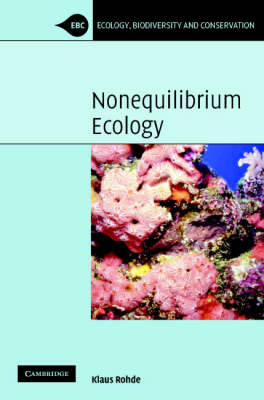
Nonequilibrium Ecology
Cambridge University Press (Verlag)
978-0-521-85434-4 (ISBN)
Ecology has long been shaped by ideas that stress the sharing of resources and the competition for those resources, and by the assumption that populations and communities typically exist under equilibrium conditions in habitats saturated with both individuals and species. However, much evidence contradicts these assumptions and it is likely that nonequilibrium is much more widespread than might be expected. This book is unique in focusing on nonequilibrium aspects of ecology, providing evidence for nonequilibrium and equilibrium in populations (and metapopulations), in extant communities and in ecological systems over evolutionary time, including nonequilibrium due to recent and present mass extinctions. The assumption that competition is of overriding importance is central to equilibrium ecology, and much space is devoted to its discussion. As communities of some taxa appear to be shaped more by competition than others, an attempt is made to find an explanation for these differences.
Klaus Rohde is Professor Emeritus at the University of New England, Australia.
Introduction; 1. Concepts and problems; 2. Nonequilibrium in communities; 3. Interspecific competition: definition and effects on species; 4. Interspecific competition: effects in communities and conclusion; 5. Non-competitive mechanisms responsible for niche restriction and segregation; 6. Patterns over evolutionary time, present mass-extinctions; 7. Some detailed examples at the population/metapopulation level; 8. Some detailed examples at the community level; 9. Some detailed biogeographical/macroecological patterns; 10. An autecological comparison: the ecology of aspidogastrea; 11. What explains the differences found? A summary, and prospects for an ecology of the future; acknowledgments; References.
| Erscheint lt. Verlag | 19.1.2006 |
|---|---|
| Reihe/Serie | Ecology, Biodiversity and Conservation |
| Zusatzinfo | 53 Line drawings, unspecified |
| Verlagsort | Cambridge |
| Sprache | englisch |
| Maße | 158 x 235 mm |
| Gewicht | 512 g |
| Themenwelt | Naturwissenschaften ► Biologie ► Ökologie / Naturschutz |
| Naturwissenschaften ► Biologie ► Zoologie | |
| ISBN-10 | 0-521-85434-2 / 0521854342 |
| ISBN-13 | 978-0-521-85434-4 / 9780521854344 |
| Zustand | Neuware |
| Haben Sie eine Frage zum Produkt? |
aus dem Bereich


